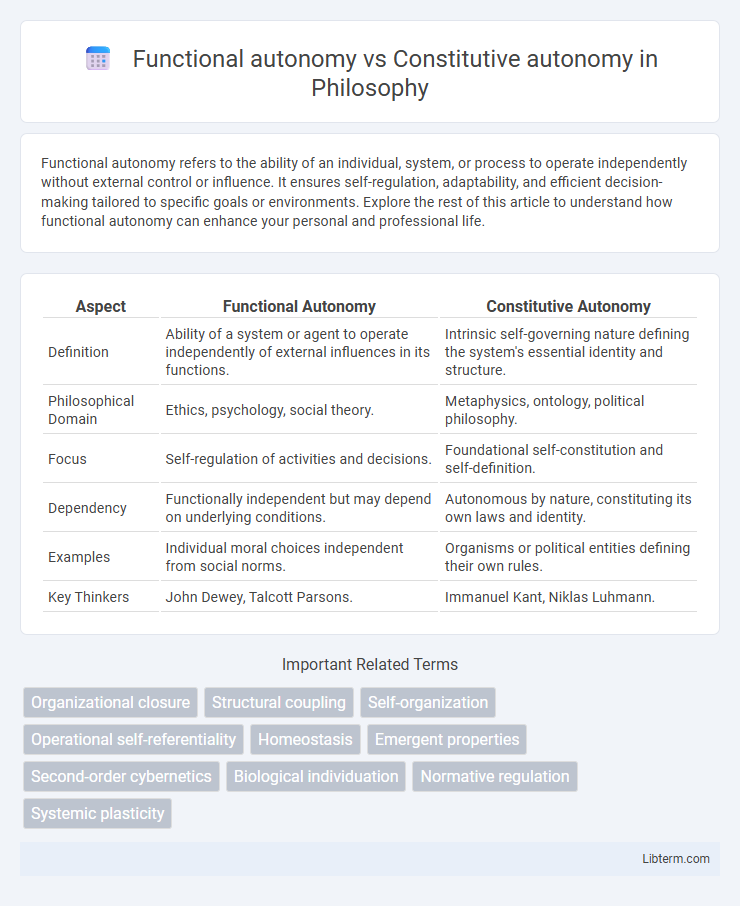Functional autonomy refers to the ability of an individual, system, or process to operate independently without external control or influence. It ensures self-regulation, adaptability, and efficient decision-making tailored to specific goals or environments. Explore the rest of this article to understand how functional autonomy can enhance your personal and professional life.
Table of Comparison
| Aspect | Functional Autonomy | Constitutive Autonomy |
|---|---|---|
| Definition | Ability of a system or agent to operate independently of external influences in its functions. | Intrinsic self-governing nature defining the system's essential identity and structure. |
| Philosophical Domain | Ethics, psychology, social theory. | Metaphysics, ontology, political philosophy. |
| Focus | Self-regulation of activities and decisions. | Foundational self-constitution and self-definition. |
| Dependency | Functionally independent but may depend on underlying conditions. | Autonomous by nature, constituting its own laws and identity. |
| Examples | Individual moral choices independent from social norms. | Organisms or political entities defining their own rules. |
| Key Thinkers | John Dewey, Talcott Parsons. | Immanuel Kant, Niklas Luhmann. |
Understanding Functional Autonomy
Functional autonomy refers to the capacity of an individual's current motives to operate independently from the original reasons for their development, emphasizing ongoing behavior driven by new, self-sustained goals. In psychological contexts, this concept explains how habits or desires maintain their existence through self-reinforcement rather than initial external incentives. Understanding functional autonomy helps clarify how certain behaviors persist autonomously, influencing motivation and personality stability over time.
Defining Constitutive Autonomy
Constitutive autonomy refers to the inherent capacity of a system to self-generate and maintain its own organization and identity without external control, distinguishing it from functional autonomy which emphasizes independent operation within a defined environment. It involves the dynamic processes that allow the system to continuously produce and preserve its components, ensuring operational closure and self-maintenance. This concept is central to theories of autonomous systems in biology and cognitive science, highlighting the system's self-constitution as a fundamental criterion for true autonomy.
Core Differences Between Functional and Constitutive Autonomy
Functional autonomy refers to a system's ability to perform tasks independently while still being influenced or constrained by external factors, emphasizing operational self-governance and adaptability. Constitutive autonomy, in contrast, involves the system's foundational capability to define its own goals and structures without external control, reflecting inherent self-organization and identity formation. Core differences include functional autonomy's task-oriented independence versus constitutive autonomy's focus on self-determination and systemic self-creation.
Philosophical Foundations of Autonomy
Functional autonomy refers to the capacity of an individual's actions to become self-sustaining and motivated by internal goals rather than external pressures, emphasizing psychological independence. Constitutive autonomy centers on the philosophical notion that the self is fundamentally self-governing, where rational agents create and adhere to their own laws or principles. Both concepts are essential in Kantian ethics and contemporary discussions on self-determination, highlighting autonomy as an interplay between action-driven functionality and foundational self-legislation.
Historical Development of Autonomy Theories
Functional autonomy emerged from Gordon Allport's work in the 1930s, highlighting how motives function independently of their origins, while constitutive autonomy traces back to philosophical traditions emphasizing self-governance and identity formation. The historical development of autonomy theories reflects a shift from viewing autonomy as mere behavioral independence to recognizing its deeper psychological and existential foundations. Modern perspectives integrate both concepts, acknowledging autonomy as a complex interplay between established functions and core self-constituting processes.
Real-World Examples of Functional Autonomy
Functional autonomy occurs when behaviors initially motivated by external rewards become self-sustaining due to intrinsic motivation, such as a person continuing to exercise regularly for personal satisfaction rather than external approval. Constitutive autonomy refers to the foundational, self-governing systems that maintain an organism's identity, exemplified by cellular processes that regulate metabolism independent of external influences. Real-world examples of functional autonomy include employees who initially work for a salary but develop a passion for their projects, or children who begin learning skills for praise but continue practicing out of genuine interest.
Applications of Constitutive Autonomy in Practice
Constitutive autonomy emphasizes an agent's self-governing capabilities essential for adapting to complex and dynamic environments, leading to its practical applications in robotics, where machines independently generate rules and alter behaviors without external programming. This form of autonomy is vital in developing advanced AI systems for autonomous vehicles, enabling real-time decision-making and learning from unpredictable scenarios. Research also applies constitutive autonomy in adaptive control systems for drones and intelligent agents, enhancing resilience and operational efficiency in uncertain conditions.
Autonomy in Technology: Function vs. Constitution
Functional autonomy in technology refers to systems' ability to operate independently in performing specific tasks without external control, enhancing efficiency and adaptability. Constitutive autonomy emphasizes the system's capacity to self-organize, self-maintain, and regulate its internal structure, defining its identity and purpose. Distinguishing between function and constitution in technological autonomy enables deeper understanding of how machines not only execute functions but also sustain their operational integrity and evolve.
Ethical Implications of Autonomous Systems
Functional autonomy refers to a system's ability to perform tasks independently within set parameters, while constitutive autonomy involves the system's capacity to self-govern and modify its own rules and goals. Ethical implications arise from constitutive autonomy as it challenges accountability, transparency, and control, raising concerns over decision-making in unpredictable scenarios. Ensuring ethical autonomous systems requires frameworks that balance operational independence with rigorous oversight to prevent harm and uphold human values.
Future Directions in Autonomy Research
Future directions in autonomy research emphasize integrating functional autonomy, which addresses an agent's ability to perform tasks independently, with constitutive autonomy that concerns self-maintenance and internal regulation. Advancements in adaptive systems and artificial intelligence aim to develop hybrid models that balance task-oriented behaviors with intrinsic self-governance mechanisms. Emerging approaches explore biologically inspired frameworks and multi-agent collaborations to enhance autonomous system robustness and flexibility in dynamic environments.
Functional autonomy Infographic

 libterm.com
libterm.com